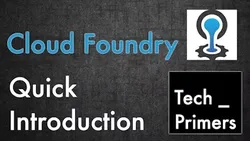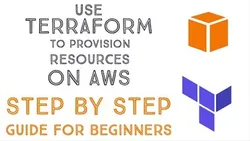
Terraform Essential Tutorial 
This course provides an introduction to Terraform, a powerful tool for automating infrastructure. It covers the basics of Terraform, including installation, configuration, and usage. It also includes demos and tutorials to help beginners understand the concepts and apply them in practice. The course also covers advanced topics such as Terraform modules and remote state management. ▼
ADVERTISEMENT
Course Feature
![]() Cost:
Cost:
Free
![]() Provider:
Provider:
Youtube
![]() Certificate:
Certificate:
Paid Certification
![]() Language:
Language:
English
![]() Start Date:
Start Date:
On-Demand
Course Overview
❗The content presented here is sourced directly from Youtube platform. For comprehensive course details, including enrollment information, simply click on the 'Go to class' link on our website.
Updated in [May 25th, 2023]
This course provides an overview of Terraform, a tool for building, changing, and versioning infrastructure safely and efficiently. It covers the fundamentals of Terraform, including installation, configuration, and usage. It also covers the Terraform basics with demo by Piyush in 2020, Terraform Advance Tutorial for Beginners with Demo 2020 by DevOpsSchool.com, and Terraforming Fundamental Tutorial by Guru in 2020 Part-1. Participants will learn how to use Terraform to create, manage, and update infrastructure. They will also learn how to use Terraform to manage cloud resources, such as virtual machines, databases, and networking. Finally, they will learn how to use Terraform to automate the deployment of applications.
[Applications]
The application of the Terraform Essential Tutorial can be seen in the automation of infrastructure as code. It can be used to create, manage, and version infrastructure resources such as virtual machines, networks, and containers. It can also be used to manage cloud services such as Amazon Web Services, Microsoft Azure, and Google Cloud Platform. Additionally, Terraform can be used to manage Kubernetes clusters and other container orchestration platforms. Furthermore, Terraform can be used to automate the deployment of applications and services.
[Career Paths]
1. Cloud Infrastructure Engineer: Cloud Infrastructure Engineers are responsible for designing, deploying, and managing cloud-based systems. They must have a strong understanding of cloud computing technologies, such as Amazon Web Services (AWS), Microsoft Azure, and Google Cloud Platform (GCP). They must also be familiar with automation tools such as Terraform, Ansible, and Chef. As cloud computing continues to grow in popularity, the demand for Cloud Infrastructure Engineers is expected to increase.
2. DevOps Engineer: DevOps Engineers are responsible for automating and streamlining the development and deployment of software applications. They must have a strong understanding of both software development and system administration. They must also be familiar with automation tools such as Terraform, Ansible, and Chef. As DevOps continues to gain traction, the demand for DevOps Engineers is expected to increase.
3. Cloud Security Engineer: Cloud Security Engineers are responsible for designing, deploying, and managing cloud-based security systems. They must have a strong understanding of cloud computing technologies, such as Amazon Web Services (AWS), Microsoft Azure, and Google Cloud Platform (GCP). They must also be familiar with automation tools such as Terraform, Ansible, and Chef. As cloud computing continues to grow in popularity, the demand for Cloud Security Engineers is expected to increase.
4. Cloud Architect: Cloud Architects are responsible for designing, deploying, and managing cloud-based systems. They must have a strong understanding of cloud computing technologies, such as Amazon Web Services (AWS), Microsoft Azure, and Google Cloud Platform (GCP). They must also be familiar with automation tools such as Terraform, Ansible, and Chef. As cloud computing continues to grow in popularity, the demand for Cloud Architects is expected to increase.
[Education Paths]
1. Bachelor of Science in Computer Science: This degree path provides students with a comprehensive understanding of computer science fundamentals, including programming, software engineering, computer architecture, and operating systems. It also covers topics such as artificial intelligence, machine learning, and data science. With the increasing demand for technology professionals, this degree path is becoming increasingly popular.
2. Bachelor of Science in Information Technology: This degree path focuses on the application of technology to solve business problems. It covers topics such as database management, network security, web development, and software engineering. This degree path is ideal for those who want to pursue a career in the IT industry.
3. Master of Science in Data Science: This degree path focuses on the analysis and interpretation of large datasets. It covers topics such as machine learning, artificial intelligence, and data mining. With the increasing demand for data scientists, this degree path is becoming increasingly popular.
4. Master of Science in Cybersecurity: This degree path focuses on the protection of computer systems and networks from malicious attacks. It covers topics such as cryptography, network security, and digital forensics. With the increasing demand for cybersecurity professionals, this degree path is becoming increasingly popular.
Course Provider

Provider Youtube's Stats at AZClass
Discussion and Reviews
0.0 (Based on 0 reviews)
Explore Similar Online Courses

Learn Moodle 33

Cloud Foundry Primer

Python for Informatics: Exploring Information

Social Network Analysis

Introduction to Systematic Review and Meta-Analysis

The Analytics Edge

DCO042 - Python For Informatics

Causal Diagrams: Draw Your Assumptions Before Your Conclusions

Whole genome sequencing of bacterial genomes - tools and applications

Terraform 101

Use Terraform to Provision Resources on AWS


Start your review of Terraform Essential Tutorial